 Sights, sounds, and sentiments from the thirty-four countries that made up the Europe of the time. 
Above is the cover of the July 1967 issue of Continental Film Review, a magazine produced by London based Eurap Publishing, which updated readers on the latest developments in European cinema. This issue focuses on the Netherlands, Yugoslavia, Sweden, Greece, Italy, and the Cannes Film Festival.
Here's an interesting quote from within: An indication of Italy's mammoth production appeared in an Italian trade journal a few weeks back which listed thirty-eight films premiered in the previous few weeks, seventy-six ready to be premiered, twenty being edited, forty-four in production, twenty-one about to start shooting and thirty-one being prepared, making a total of 230 films (including, of course, co-productions).
You probably think that's an enormous number, but last year Italy released 356 films. It's amazing how much there is to see from other countries if you care to look, and that's largely what Continental Film Review was about. We have twenty-plus scans below, and other issues scattered here and there in places around the website.
                     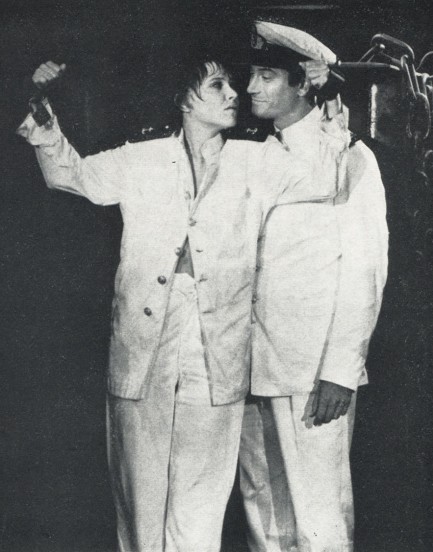   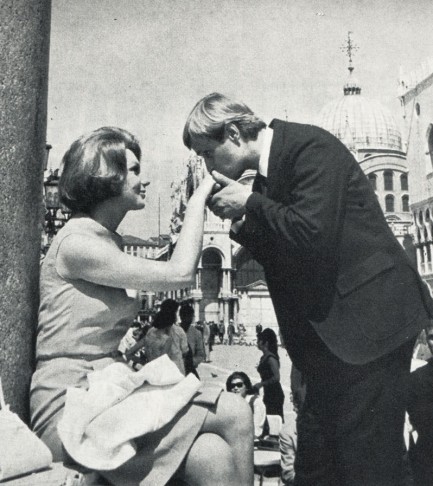 
 Look at that view, men! Just think how much money a trip like this would cost us if we were civilians! 
Donald Downes' World War II combat and espionage novel The Scarlet Thread originally appeared in 1953, with this Panther Book edition coming in 1959, adorned with cover art from an unknown. Like many mid-century war novelists, Downes saw it all firsthand. He was in the Office of Naval Intelligence (ONI), the British Security Coordination (BSC), and the OSS (we don't need to decipher that one, right?), and saw action against the fascists in Italy and Egypt. This novel, his first, draws on those experiences in telling the story of an aviator sent on a mission to eliminate a suspected double agent. Its French translation won Downes the 1959 Grand Prix de Littérature policière. Mission accomplished.
 A heady new brew of tabloid gossip gets served up in Hollywood. 
We have a brand new tabloid to our website today—the colorful Off the Record Secrets, of which you see its June 1963 cover above. This was published by an outfit calling itself Magazette, Inc., which aimed for the high end of the tabloid market with bright fronts along the same lines as the big boys Confidential, Whisper, Hush Hush, et al. Like those, Off the Record Secrets covers miles of ground between its pages, spilling on everyone from Hugh Hefner and his Bunnies, to Frank Sinatra and his Pack, to Elsa Martinelli and her hubby Franco Mancinelli Scotti, to Kirk Douglas and his bad behavior.
Of the items on offer, we were struck by the photo of Annette Stroyberg stuffing her face. We always thought trying to catch celebrities eating in embarrassing fashion started with the internet gossip sites, but apparently we were wrong. In any case you can see why the best restaurants have private dining rooms. Stroyberg must have been furious. Also of note, you Cary Grant fans get see him in a towel at age sixty-one. He's holding together nicely, though there seems to be some stomach sucking going on. Still, nothing to be ashamed of. He's got ninety-five percent of men his age beat.
The earliest issue we've seen of Off the Record Secrets is from January 1962. By the early 1960s the tabloid market was crowded, therefore owing at least partly to a logjam on newsstands, this magazine lasted only into 1964 before folding its tent. Because of its scarcity issues sometimes go for hefty prices. We got ours for $19.00. But we've seen them auctioning for $75.00. The high pricing means we may not buy another example for a while, but we'll get it done. In the meantime, get acquainted with Off the Record Secrets. We have multiple rare images for you below.
       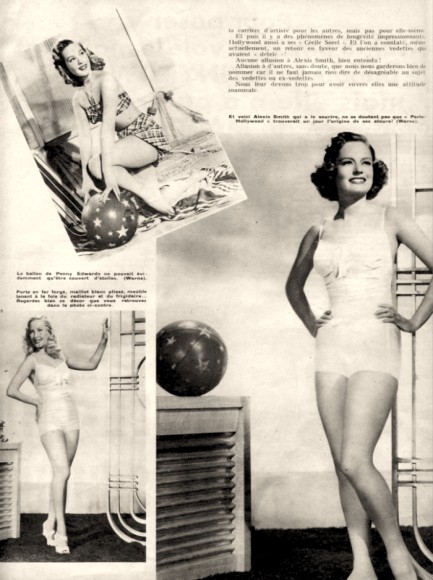                     
 Aslan's must-have aquatic fashion accessory.  
Above: two efforts from Alain Gourdon, aka Aslan, the first for 1960's Le soliel et le lion, credited to an author who went by Commandant René, and the second for 1954's Folie sous le chapiteau by Geo Marc. Aslan was into starfish, we guess. And now we are too.
 Every top notch private investigator knows the best clues are found in bed. 
We wanted to show you another poster painted by John Solie, who was responsible for numerous blaxploitation, sexploitation, and action promos, all executed at the extremely high level you see here with his one sheet for Stacey. His other notable efforts include those for The Arena, Star Crash, Hit Man, and Hollywood Boulevard. You can click his keywords at bottom to see everything we've shared from him.
Naturally we watched Stacey and it's a cheesy detective tale starring erstwhile Playboy centerfold Anne Randall, who plays a model-turned-private dick hired to investigate a rich woman's extended family before any of them are allowed to be included in her will. Randall arrives just in time for intrigue and murder. Private investigators need to possess a Class C license in order to legally take on clients. The C on Randall's license probably stands for “casual sex.”
Even so, there's not much here. The detective elements are uninspiring despite a noir style voiceover, and the sexual elements, even with Randall and co-star Anitra Ford in occasional undress, are not going to blow your skirt up. To put the overall nothingness of the movie in perspective, consider the fact that we couldn't find a copy with sharp enough resolution to make screenshots worthwhile, nor enough official production photos to make them worth sharing. That's how much of a historical afterthought it is.
In lieu of imagery you could use your imagination, but we recommend not bothering. Stacey resides at the low end of grindhouse cinema characterized by numerous bold and outrageous entries. In our opinion it's notable only for being the first exploitation effort by director Andy Sidaris, who would go on to helm boobalicious ’80s throwaways such as Malibu Express, Hard Ticket to Hawaii, and Savage Beach. Stacey premiered in the U.S. this month in 1973.
 People are being eaten by sharks but the hipsters of the Mexican Riviera are too groovy to care. 
¡Tintorera!, for which you see a poster above, is often presumed to be within the pantheon of Jaws knockoffs, and that's true, but barely. There's a giant shark, and it eats a few people, but ¡Tintorera! couldn't be more different in tone than Spielberg's blockbuster. It's a counterculture movie set in and around Cancún, Tulum, and the Rivera Maya. A considerable amount of script is spent exploring free love and utopian lifestyles. Shark hunters Andrés Garcia and Hugo Stiglitz fashion an exclusive three-way relationship with Susan George. They also mix and match with Laura Lyons and Jennifer Ashley, and each bed down on consecutive nights with Fiona Lewis, which catalyzes a transformation from professional rivals to friends. Discussions of sexual sharing and finding new ways to live take up far more running time than anything to do with sharks.
But sharks there indeed are—specifically, a large tiger shark whose first victim is Lewis. She's eaten during a nude swim, which is another resemblance to Jaws. But to give a sense of how different ¡Tintorera! really is, consider that Lewis appears to be the movie's star during its first half hour, and when she vanishes no trace of her is ever found and nobody much cares that she's gone. They assume she left the country. In cinema's imaginary countercultureworld, who has time to ask questions? The focus of the film shifts to Garcia and Stiglitz's rivalry-cum-friendship. Shortly afterward, Susan George arrives, and the focus shifts again, onto the aformentioned threesome. But then she leaves, and suddenly Lyons and Ashley are the main love interests. Then one of them is eaten too. This round robin approach, in our experience, is unique in a film that isn't anthological or episodic, and it's jarring, to be sure.
Another aspect of ¡Tintorera! that might jar is it usage of real sharks and extremely practical special effects. Many actual sharks are killed. A loggerhead turtle is killed via throat cutting and hung over the side of a boat to make a blood trail. We don't think the Mexican filmmakers Conacite Uno and Productora Filmica Real added a disclaimer to the credits about no animals being harmed. Somehow they got a shark to swim around with a fake human torso sticking out of its mouth. Another shark is made to carry around a human lower body trailing yards of intestines. We don't know how the filmmakers achieved these striking scenes, but they look very real. So if all of what we've written doesn't make the film's slender free love plot sound enticing, maybe watch it for the gory efx. You'll marvel. ¡Tintorera! premiered in Mexico today in 1977.
  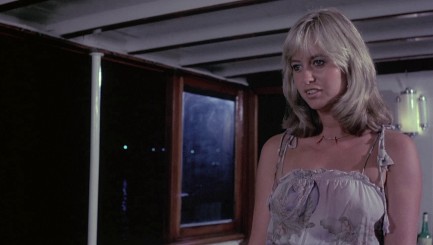       
 Strange ideas from the minds and lenses of mid-century promo photographers. 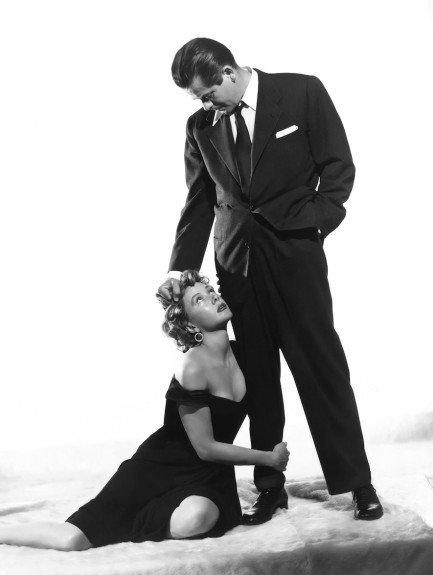 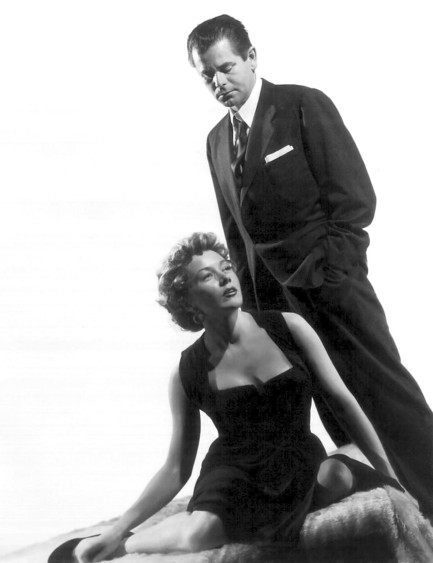 A while back we shared a promo photo of Glenn Ford and Gloria Grahame from 1953's The Big Heat that was meant to imply oral sex (it absolutely was, and you can see for yourself here). We commented on its weirdness, and noted that an actress would probably not be asked or made to pose that way today. The shot got us thinking about whether there were other kneeling promo shots from the mid-century era, and above you see two others from The Big Heat. Below we have more such shots, and while none are as jarring as that previous promo, they're all interesting. We assumed there would be few if any featuring kneeling males, but we found a couple. Even so, there are probably scores more kneeling actresses that we missed. While many of shots took the form they did to highlight the criminal/victim themes in their parent films, you still have to wonder what else—consciously or not—was in the various photograhers' minds. Anyway, just some food for thought this lovely Thursday. Ready, set discuss! 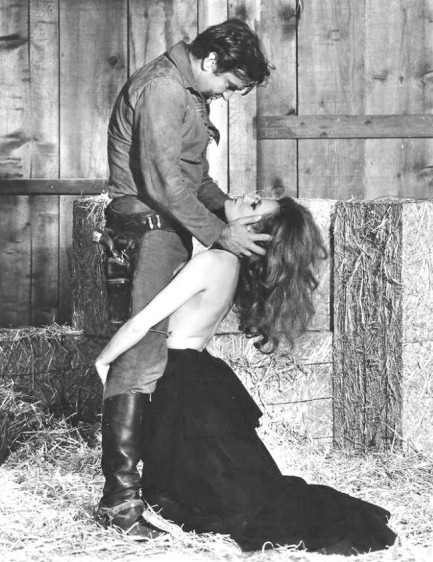 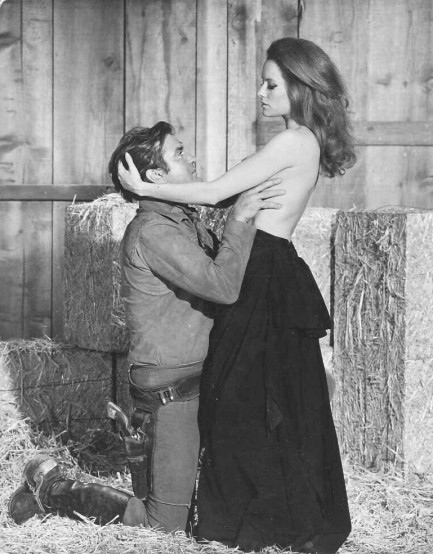 Rod Taylor and Luciana Pauluzzi swap subordinate positions for 1967's Chuka. Rod Taylor and Luciana Pauluzzi swap subordinate positions for 1967's Chuka.
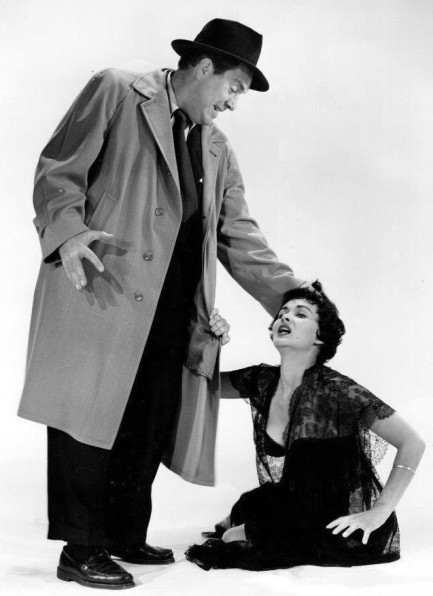 Edmund O'Brien goes for the time honored hair grab on Marla English for 1954's Shield for Murder. Edmund O'Brien goes for the time honored hair grab on Marla English for 1954's Shield for Murder.
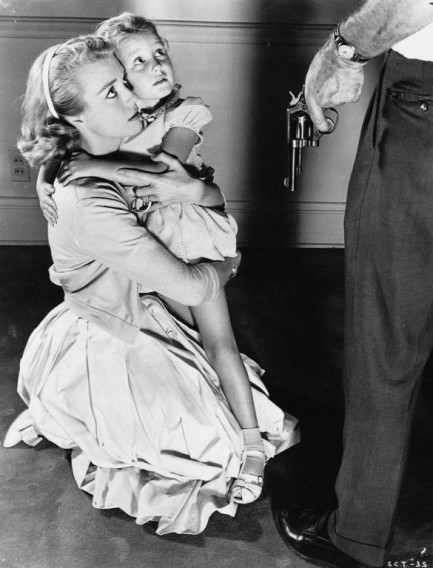 Inger Stevens and Terry Ann Ross for Cry Terror, an adaptation of a novel we talked about a few years ago. Inger Stevens and Terry Ann Ross for Cry Terror, an adaptation of a novel we talked about a few years ago.
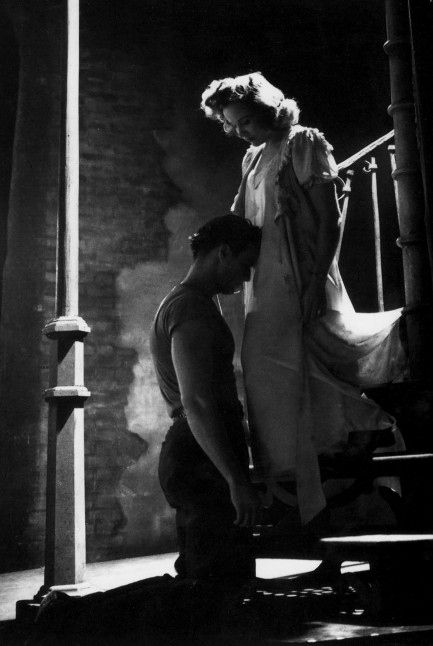 Kim Hunter soothes an overheated Marlon Brando in a promo for 1951's A Streetcar Named Desire. Kim Hunter soothes an overheated Marlon Brando in a promo for 1951's A Streetcar Named Desire.
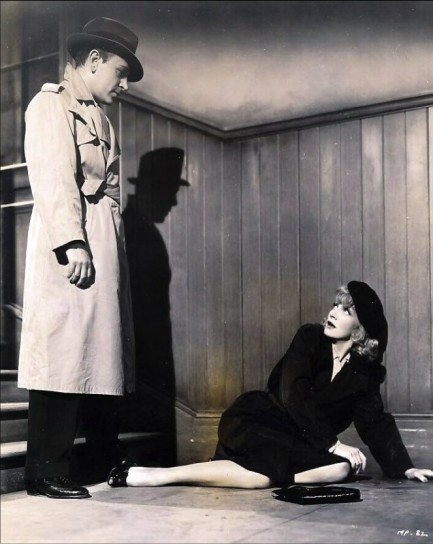 George Raft menaces Marlene Dietrich in the 1941 comedy Manpower. George Raft menaces Marlene Dietrich in the 1941 comedy Manpower.
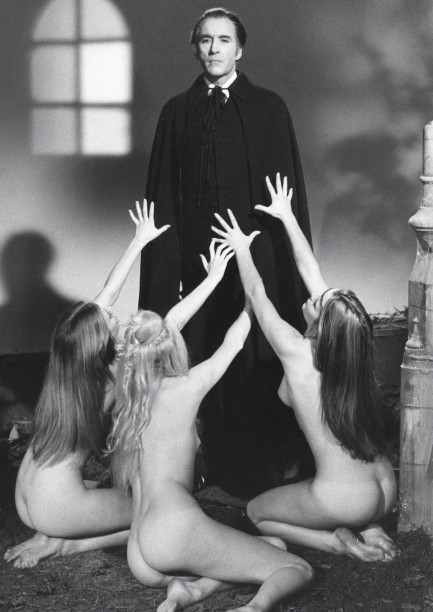 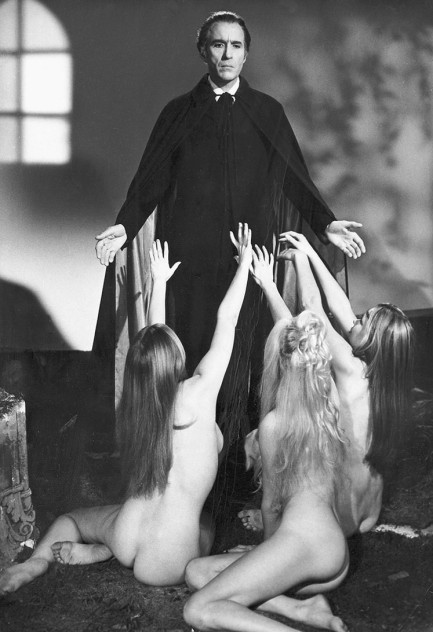 As promos go, these actually make sense. They show three unidentified models mesmerized by vampire Christopher Lee for 1970's Taste the Blood of Dracula. As promos go, these actually make sense. They show three unidentified models mesmerized by vampire Christopher Lee for 1970's Taste the Blood of Dracula.
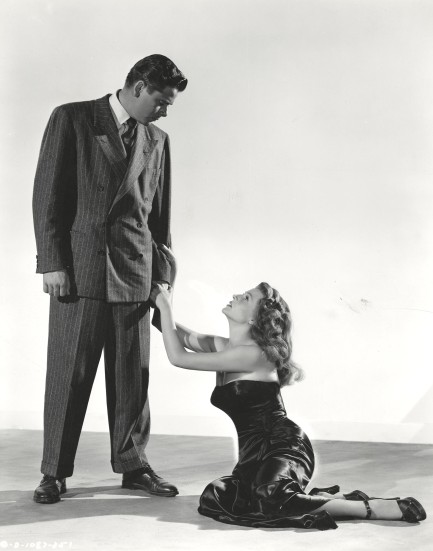 Glenn Ford is at it again, this time looming over Rita Hayworth for the 1946 classic Gilda. Glenn Ford is at it again, this time looming over Rita Hayworth for the 1946 classic Gilda. 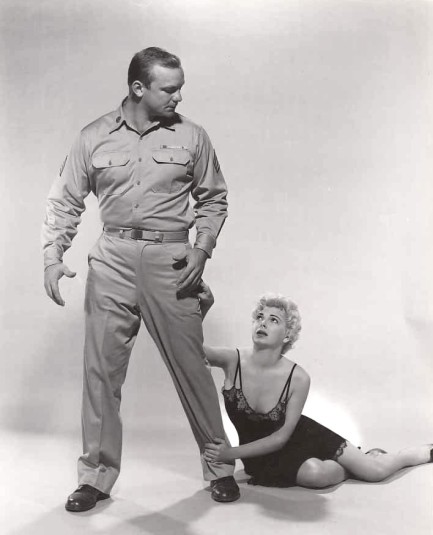 Aldo Ray and Barbara Nichols for 1958's The Naked and the Dead. Aldo Ray and Barbara Nichols for 1958's The Naked and the Dead.
 This one shows less domination and more protectiveness, as Humphrey Bogart prepares to defend Ida Lupino for High Sierra, 1941. This one shows less domination and more protectiveness, as Humphrey Bogart prepares to defend Ida Lupino for High Sierra, 1941.
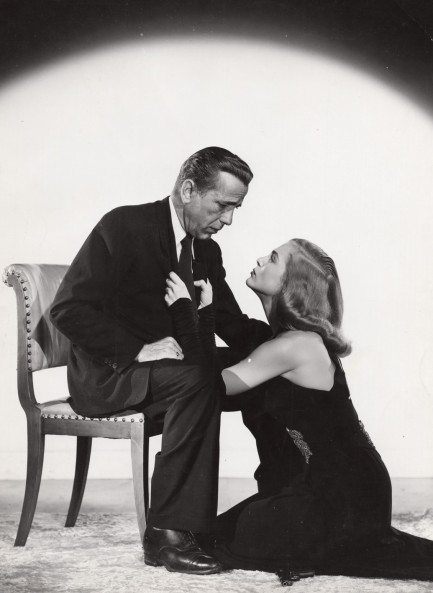 Humphrey once more. Here he's with Lizabeth Scott for Dead Reckoning, 1947. Humphrey once more. Here he's with Lizabeth Scott for Dead Reckoning, 1947.
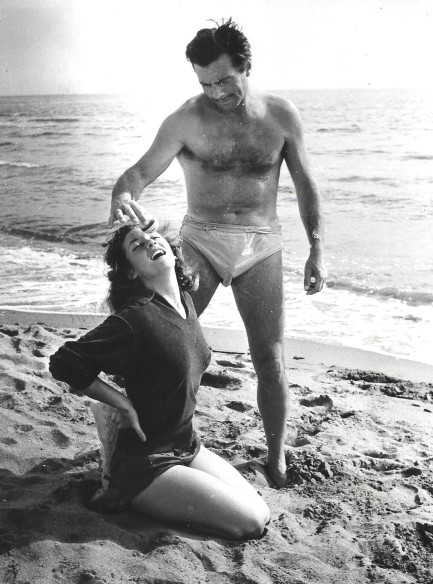 This shot shows Brazilian actress Fiorella Mari with an actor we can't identify in a movie we also can't identify. This shot shows Brazilian actress Fiorella Mari with an actor we can't identify in a movie we also can't identify.
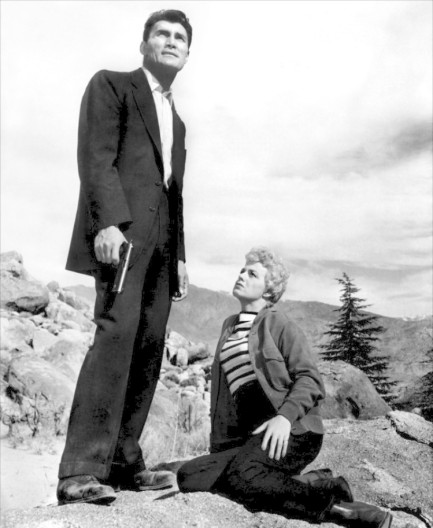 Shelly Winters and Jack Palance climb the highest mountain together for I Died a Thousand Times, 1955. Shelly Winters and Jack Palance climb the highest mountain together for I Died a Thousand Times, 1955.
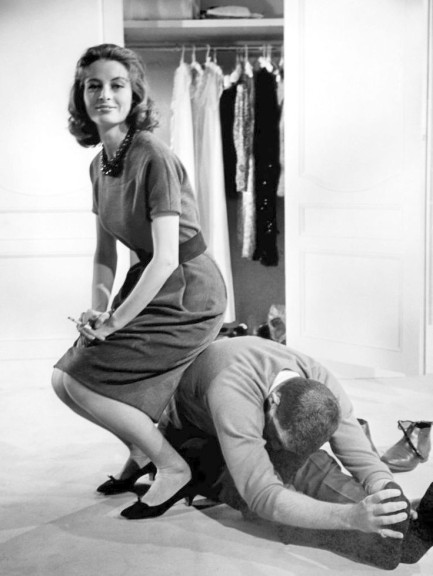 As we said, we didn't find as many examples of kneeling men, but we found this gem—Cappucine makes a seat of director Blake Edwards on the set of The Pink Panther in 1963. Does this count, though? While Edwards is subordinate, he isn't kneeling and it really isn’t a legit promo. As we said, we didn't find as many examples of kneeling men, but we found this gem—Cappucine makes a seat of director Blake Edwards on the set of The Pink Panther in 1963. Does this count, though? While Edwards is subordinate, he isn't kneeling and it really isn’t a legit promo.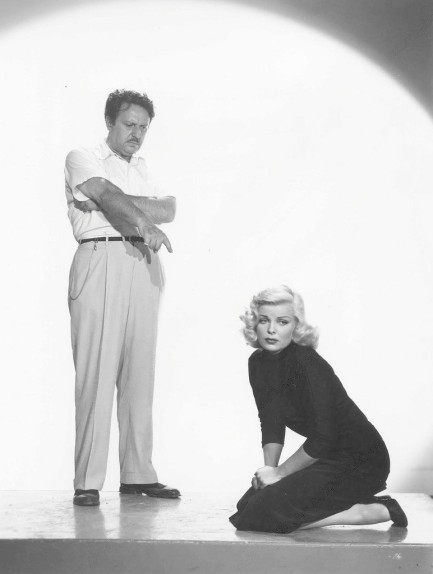 And lastly, in a curious example, Hugo Haas seems to tell Cleo Moore to stay in a shot made for 1953's One Girl's Confession. And lastly, in a curious example, Hugo Haas seems to tell Cleo Moore to stay in a shot made for 1953's One Girl's Confession.
 Doing her part to take a bite out of crime. 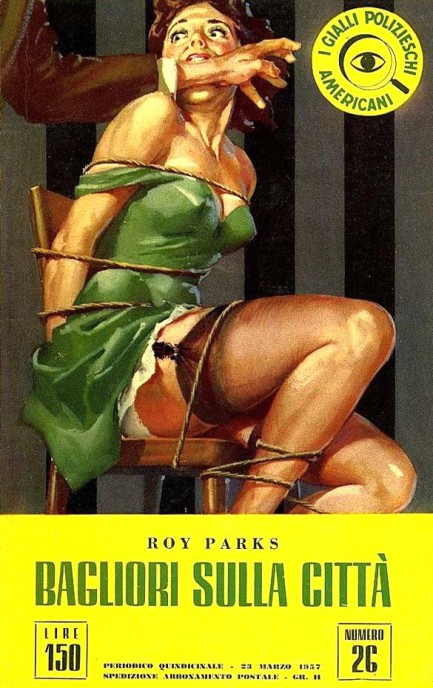
Above is the cover of Bagliori sulla città, written by Roy Parks for S.P.E.R.O.’s series I Gialli Polizieschi Americani, 1957. Parks was actually a writer named Mario Casacci, who also published novels as Bill Coleman, Mario Kasak, Rex Sheridan, and possibly others. He was also a noted screenwriter most famous for inventing, along with Alberto Ciambricco, the figure of Lieutenant Sheridan, who was a staple on Italian television through the 1960s and early 1970s, played by Ubaldo Lay. Casacci also participated on several soundtracks as a lyricist. The art here is from Averardo Ciriello, who we’ve featured before here and here on movie posters.
 You never know what you'll find if you go far enough up the Amazon. 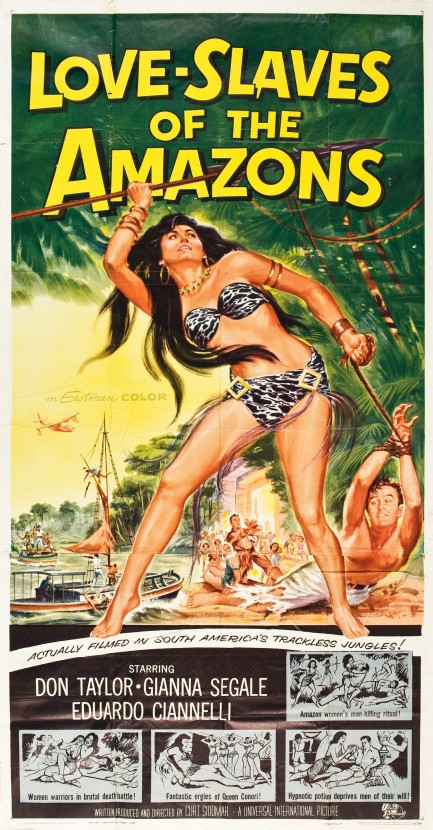 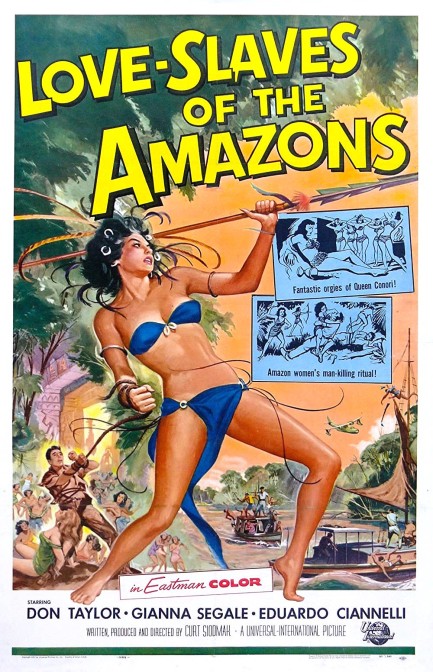
Written, produced, and directed by Curt Siodmak, who was behind numerous monster features, including Bride of the Gorilla and Curucu, the tropical adventure Love Slaves of the Amazon, which premiered today in 1957, is a full color production about the search for a lost realm of warrior women and their priceless treasures. In order for the expedition to take place, semi-crazy Eduardo Ciannelli must convince staid Don Taylor that the Amazons exist. He reveals a golden statue as proof, which he'd obtained on a previous foray into the jungle, and after some back and forth, sufficient funds for the journey are obtained. Unfortunately, rumors of gold and diamonds have piqued the interest of local ruffians, who plan to hijack the expedition.
Are there actually Amazons? You bet. French actress Anna Maria Nabuco is their queen. Are there love slaves? Yup, one poor exhausted one, anyway, and Taylor looks ripe as a replacement as far as Nabuco is concerned. And is there treasure? There's that too. The movie's plusses include a pitched battle between the expedition and the hijackers while both their boats are mired in river mud, and various exteriors actually shot in Manaus, Brazil and the nearby rain forest. Additionally, the poster art by Reynold Brown is tops. On the minus side, we felt that intermittent veerings into comedy were pointless and unfunny. But on the whole, Love Slaves of the Amazons was better than we expected. Does that mean it was good? Define “good.”
 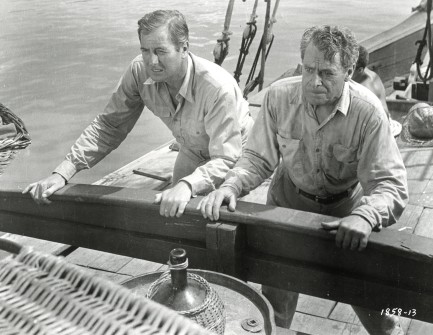 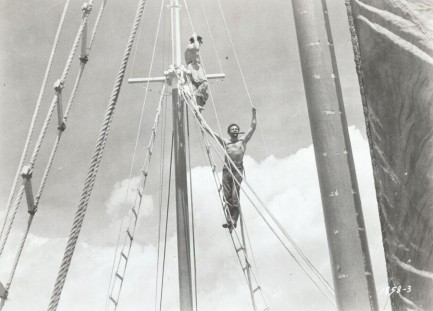  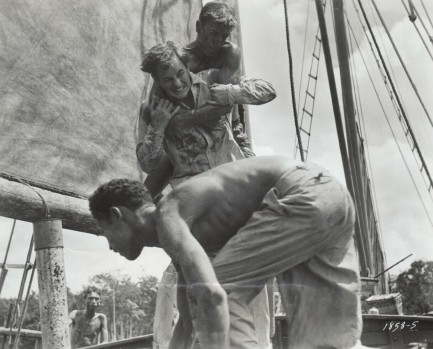 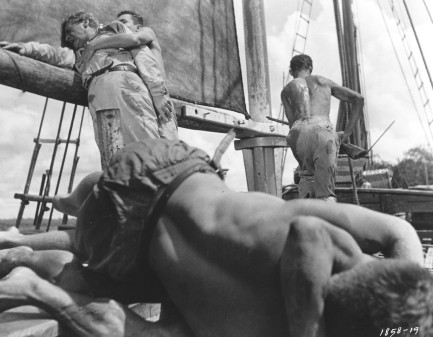 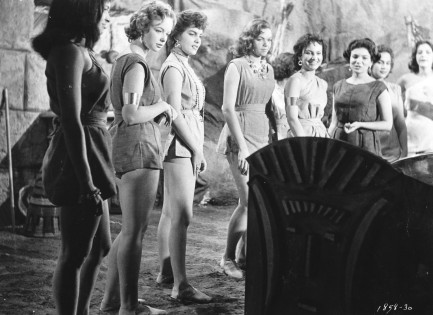 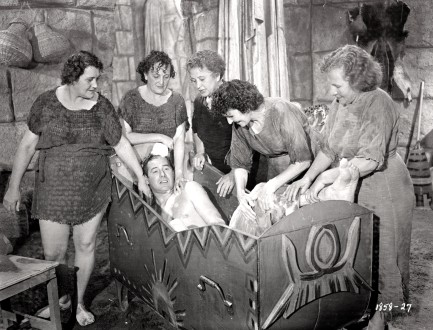 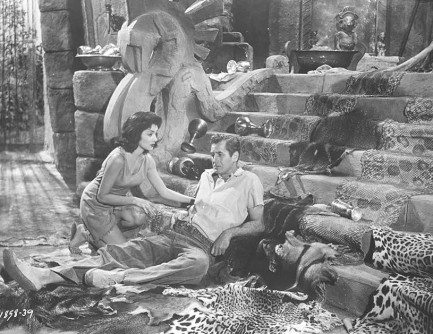 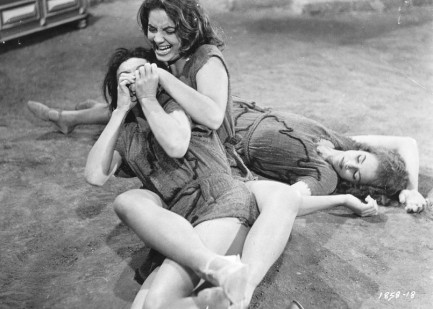 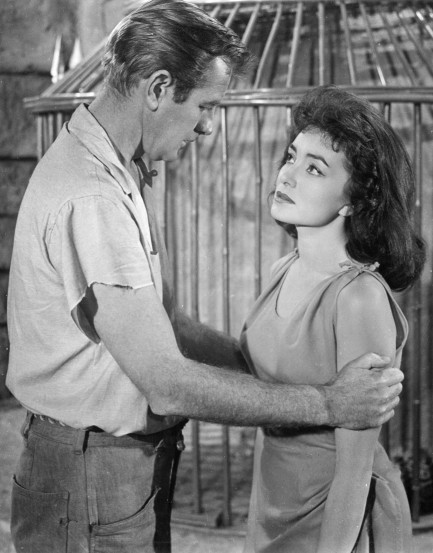 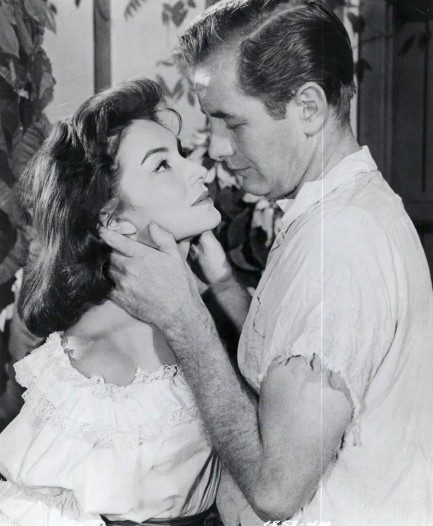 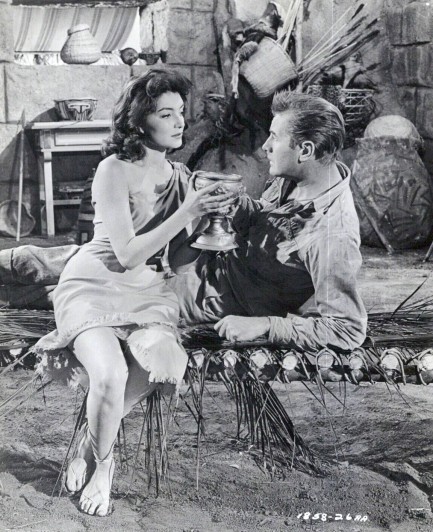 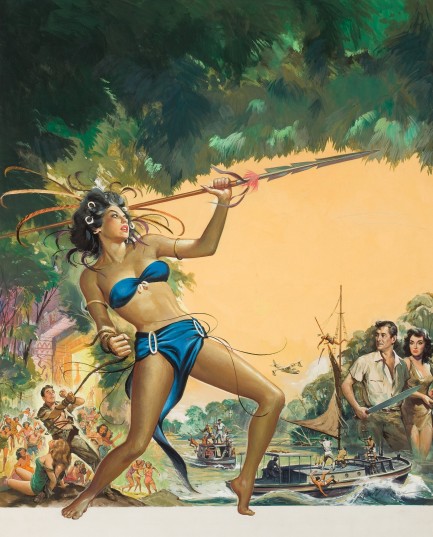 
 Cold War spies make waves in the City of Canals. 
The Venetian Affair, which premiered today in 1966, has a rather interesting promo poster. It was painted by U.S. artist Frank McCarthy, who was big in paperback covers early in his career, moved into high-budget movie promos such as James Bond posters, and finally made a mark in realist fine art. We love this piece from him. There's a lot going on. If you check out his effort for You Only Live Twice here you'll see how dense and chaotic his work could be, same as above, where he has people falling off the bridge, off the gondola, and guns being brandished everywhere. In addition, his likenesses of the movie's stars are good. He was a major talent.
The first observation you might make while watching The Venetian Affair is that it would be impossible to make a similar movie in that city today. Nearly four million tourists visited Venice in 2022, making nearly every street—and certainly every site of special historical note—like the mass exodus from a just-completed football game. With that level of humanity about, closing parts of the city or main squares—while maybe possible—would not be practical or economical.
But The Venetian Affair was made back when quiet streets and dark corners existed. Old world architecture always makes for a good spy movie backdrop. That's exactly what you get in this adventure about a mind control drug being used to foment conflict between the U.S. and U.S.S.R. Robert Vaughn stars as a former CIA agent who was fired after he married Elke Sommer, who was suspected of being a double agent. Vaughn never found out whether that was true because he and Sommer were torn apart by turbulent events. But when a bomb blows up a Venice political conference and Sommer is thought to be involved, the CIA drags Vaughn back into its clutches to find Sommer, as well as the crucial clue that might explain the bombing.
Vaughn is a cool and composed actor, any movie with Sommer is one we'll watch, and co-stars Felicia Farr, Luciana Paluzzi, Ed Asner, and the venerable Boris Karloff are all enticements, but we can't say The Venetian Affair is a scintillating example of a Cold War spy flick. It's such a fertile sub-genre, one that produced some of the best movies of 1950s through 1970s. Even against the beautiful Venice backdrop it mostly falls flat due to a screenplay that never hits any highs. But that doesn't mean you shouldn't watch it. Though it lacks highs, it also lack any serious lows. You can spend your time worse ways. Plus—Sommer. What more do you need?
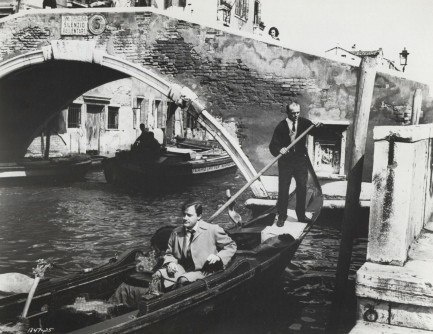 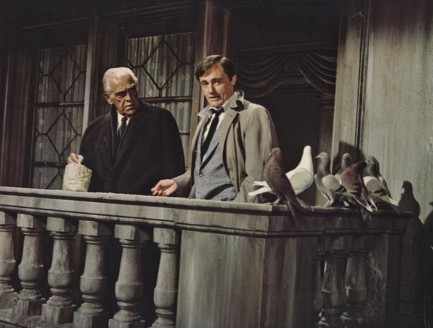 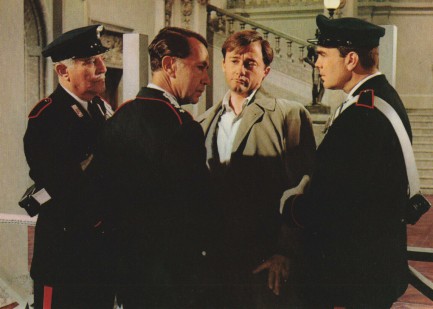    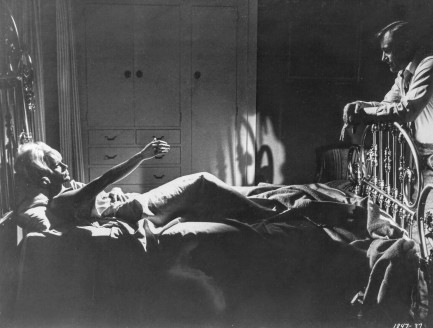 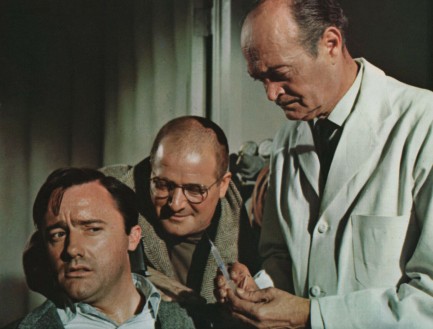 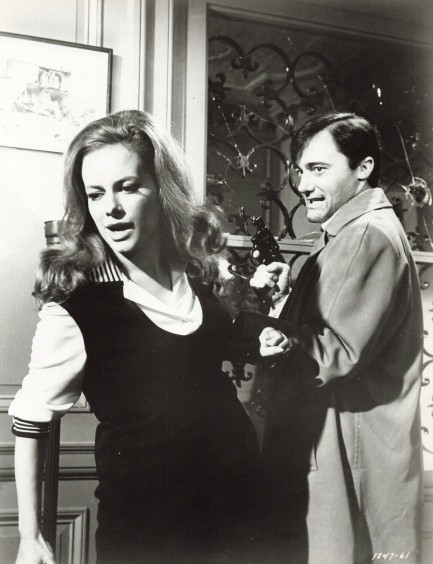 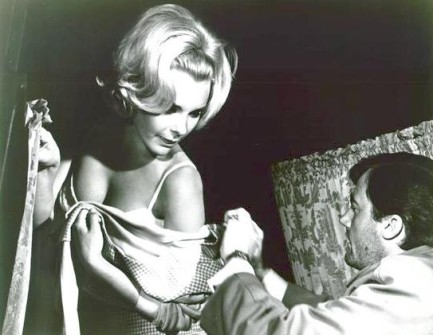 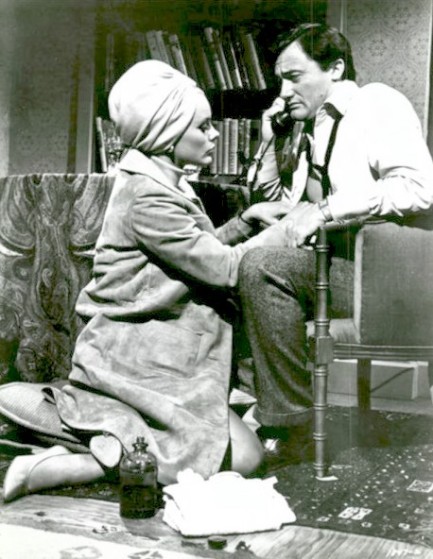 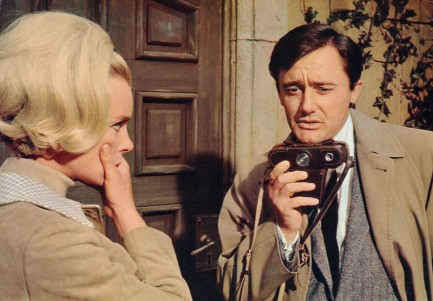 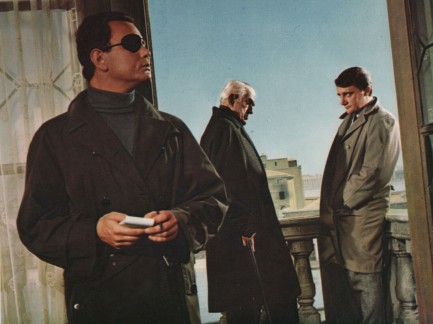 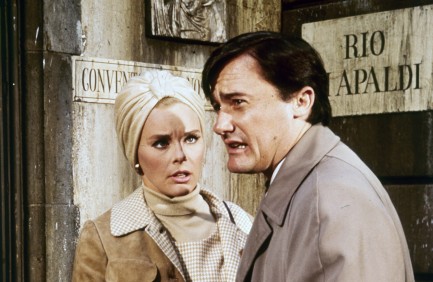 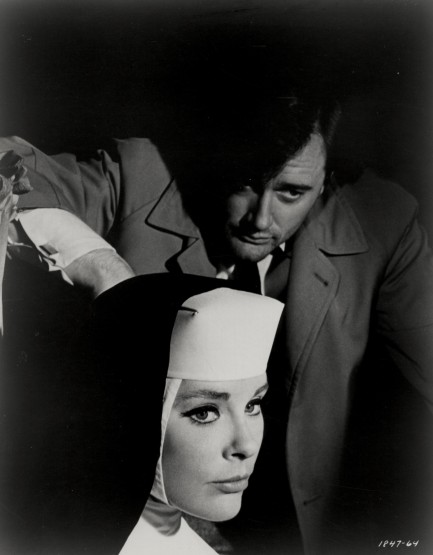 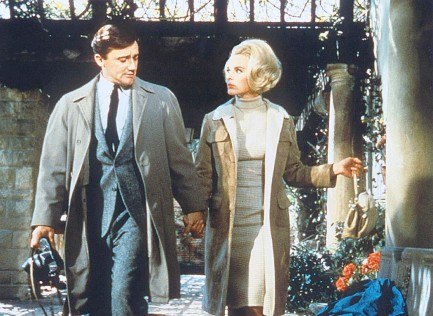 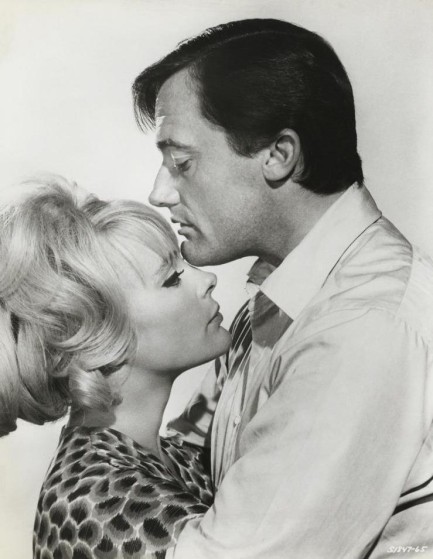 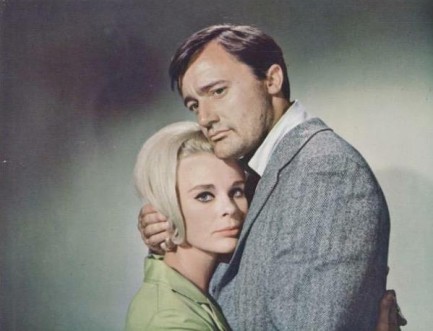 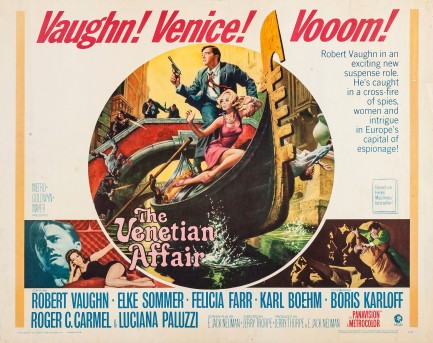 

|
 |

The headlines that mattered yesteryear.
2003—Hope Dies
Film legend Bob Hope dies of pneumonia two months after celebrating his 100th birthday. 1945—Churchill Given the Sack
In spite of admiring Winston Churchill as a great wartime leader, Britons elect
Clement Attlee the nation's new prime minister in a sweeping victory for the Labour Party over the Conservatives. 1952—Evita Peron Dies
Eva Duarte de Peron, aka Evita, wife of the president of the Argentine Republic, dies from cancer at age 33. Evita had brought the working classes into a position of political power never witnessed before, but was hated by the nation's powerful military class. She is lain to rest in Milan, Italy in a secret grave under a nun's name, but is eventually returned to Argentina for reburial beside her husband in 1974. 1943—Mussolini Calls It Quits
Italian dictator Benito Mussolini steps down as head of the armed forces and the government. It soon becomes clear that Il Duce did not relinquish power voluntarily, but was forced to resign after former Fascist colleagues turned against him. He is later installed by Germany as leader of the Italian Social Republic in the north of the country, but is killed by partisans in 1945.
|

|
|

It's easy. We have an uploader that makes it a snap. Use it to submit your art, text, header, and subhead. Your post can be funny, serious, or anything in between, as long as it's vintage pulp. You'll get a byline and experience the fleeting pride of free authorship. We'll edit your post for typos, but the rest is up to you. Click here to give us your best shot.

|
|



















































































 Rod Taylor and Luciana Pauluzzi swap subordinate positions for 1967's Chuka.
Rod Taylor and Luciana Pauluzzi swap subordinate positions for 1967's Chuka. Edmund O'Brien goes for the time honored hair grab on Marla English for 1954's Shield for Murder.
Edmund O'Brien goes for the time honored hair grab on Marla English for 1954's Shield for Murder.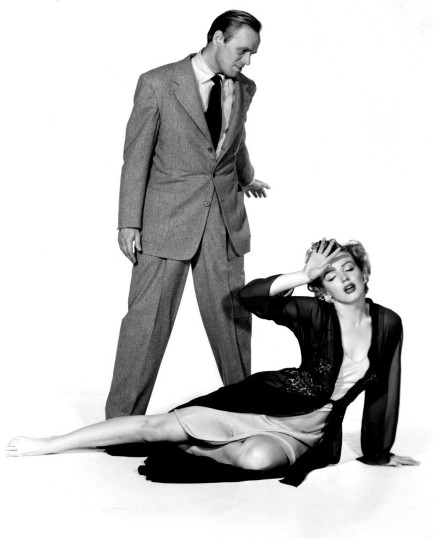 Marilyn Monroe swoons as Richard Widmark snarls for Don't Bother To Knock, 1952.
Marilyn Monroe swoons as Richard Widmark snarls for Don't Bother To Knock, 1952. Inger Stevens and Terry Ann Ross for Cry Terror, an adaptation of a novel we talked about a few years ago.
Inger Stevens and Terry Ann Ross for Cry Terror, an adaptation of a novel we talked about a few years ago. Kim Hunter soothes an overheated Marlon Brando in a promo for 1951's A Streetcar Named Desire.
Kim Hunter soothes an overheated Marlon Brando in a promo for 1951's A Streetcar Named Desire. George Raft menaces Marlene Dietrich in the 1941 comedy Manpower.
George Raft menaces Marlene Dietrich in the 1941 comedy Manpower.
 As promos go, these actually make sense. They show three unidentified models mesmerized by vampire Christopher Lee for 1970's Taste the Blood of Dracula.
As promos go, these actually make sense. They show three unidentified models mesmerized by vampire Christopher Lee for 1970's Taste the Blood of Dracula. Glenn Ford is at it again, this time looming over Rita Hayworth for the 1946 classic Gilda.
Glenn Ford is at it again, this time looming over Rita Hayworth for the 1946 classic Gilda. Aldo Ray and Barbara Nichols for 1958's The Naked and the Dead.
Aldo Ray and Barbara Nichols for 1958's The Naked and the Dead. This one shows less domination and more protectiveness, as Humphrey Bogart prepares to defend Ida Lupino for High Sierra, 1941.
This one shows less domination and more protectiveness, as Humphrey Bogart prepares to defend Ida Lupino for High Sierra, 1941. Humphrey once more. Here he's with Lizabeth Scott for Dead Reckoning, 1947.
Humphrey once more. Here he's with Lizabeth Scott for Dead Reckoning, 1947. This shot shows Brazilian actress Fiorella Mari with an actor we can't identify in a movie we also can't identify.
This shot shows Brazilian actress Fiorella Mari with an actor we can't identify in a movie we also can't identify. Shelly Winters and Jack Palance climb the highest mountain together for I Died a Thousand Times, 1955.
Shelly Winters and Jack Palance climb the highest mountain together for I Died a Thousand Times, 1955. As we said, we didn't find as many examples of kneeling men, but we found this gem—Cappucine makes a seat of director Blake Edwards on the set of The Pink Panther in 1963. Does this count, though? While Edwards is subordinate, he isn't kneeling and it really isn’t a legit promo.
As we said, we didn't find as many examples of kneeling men, but we found this gem—Cappucine makes a seat of director Blake Edwards on the set of The Pink Panther in 1963. Does this count, though? While Edwards is subordinate, he isn't kneeling and it really isn’t a legit promo. And lastly, in a curious example, Hugo Haas seems to tell Cleo Moore to stay in a shot made for 1953's One Girl's Confession.
And lastly, in a curious example, Hugo Haas seems to tell Cleo Moore to stay in a shot made for 1953's One Girl's Confession. 














































































































